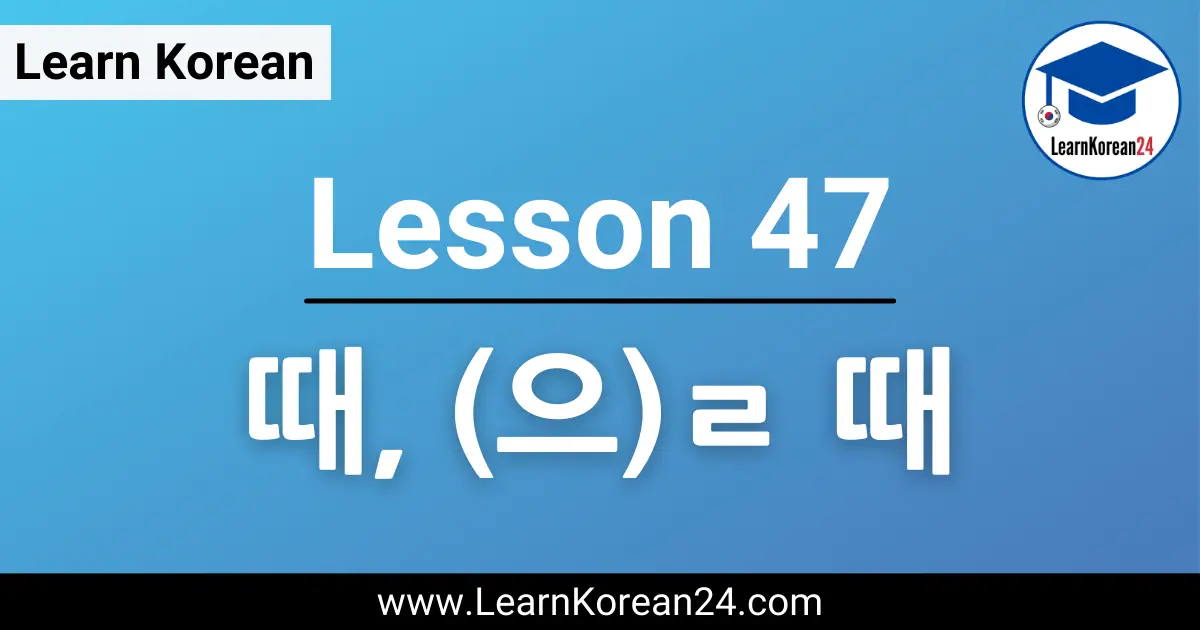Lesson 47: 때, (으)ㄹ 때
In this lesson, you will learn about 때 and (으)ㄹ 때. These structures are used to say ‘at/during’ or ‘when’. By the end of this lesson, you’ll be able to say things like, “I usually go to England during my vacation.“, “When the weather is good, I go to the mountain.“, etc.
Lesson 47: 때, (으)ㄹ 때
때
때 is used with nouns only, and is used to express ‘at a certain time‘ or ‘during a certain event‘. There are no special conjugation rules with 때 as it is a word, not a particle. Just remember to leave a space between the noun and 때. See the table below for an example.
| Conjugation Rule | Examples |
|---|---|
| Noun + 때 | 휴가 (vacation) → 휴가 때 시험 (test) → 시험 때 |
Example Sentences With 때
시험 = test
시험 때 옆 사람하고 이야기하면 안 돼요. = During the test, you should not talk to the person next to you.
생일 = birthday
올해 생일 때 뭐 하고 싶어요? = What do you want to do on* your birthday this year?
저녁 = evening
내일 저녁 때 만날까요? = Shall we meet in* the evening tomorrow?
*‘at’, ‘on’, and ‘in’ are all realized by the Korean word 때 when you are expressing ‘at a certain time’.
(으)ㄹ 때
(으)ㄹ 때 is used with verbs and adjectives only. (으)ㄹ 때 express ‘when‘ in the sense of ‘when an action occurs‘, or ‘while’ in the sense of ‘while something is/was happening’. When attaching (으)ㄹ 때 to verbs or adjectives, you must choose either 을 때 or ㄹ 때. The one you use depends on whether the verb ends in a consonant or a vowel. See the table below.
| Conjugation Rule | Examples |
|---|---|
| Verb Stem Ends In Consonant + 을 때 | 먹다 (to eat) → 먹을 때 |
| Verb Stem Ends In Vowel + ㄹ 때 | 가다 (to go) → 갈 때 |
| <Irregular Conjugations> | 살다 (to live) → 살 때 듣다 (to listen) → 들을 때 춥다 (to be cold) → 추울 때 짓다 (to build) → 지을 때 이렇다 (to be like this) → 이럴 때 |
Example Sentences With (으)ㄹ 때
먹다 = to eat
밥을 먹을 때 텔레비전을 봐요. = When I eat a meal, I watch TV. / While eating, I watch TV.
보다 = to watch
영화관에서 영화를 볼 때 핸드폰을 꺼야 돼요. = When you watch a movie at the theater, you should turn off your phone. / While watching a movie at the theater, you should turn off your phone.
있다 = to have
시간이 있을 때 뭐 해요? = What do you do when you have free time?
좋다 = to be good
날씨가 좋을 때 산에 가요. = When the weather is good, I go to the mountain.
심심하다 = to be bored
심심할 때 친구한테 전화해요. = When I feel bored, I call my friend.
Past Tense Sentences
The past tense form of (으)ㄹ 때 is 았/었/였을 때. However, in past tense sentences, the final verb is already in the past tense, so it is not necessary to use the past tense form 았/었/였을 때. In fact, when you want to express that something happened during a certain period in the past, you can use either (으)ㄹ 때 or the past tense form 았/었/였을 때. For example,
어릴 때 사탕을 좋아했어요. = When I was young, I liked candy.
어렸을 때 사탕을 좋아했어요 = When I was young, I liked candy.
서울에 살 때 공원에 자주 갔어요. = When I lived in Seoul, I often went to the park.
서울에 살았을 때 공원에 자주 갔어요. = When I lived in Seoul, I often went to the park.
There are some instances, however, where the past form 았/었/였을 때 should be used. When the past tense form 았/었/였을 때 is used, it indicates that an action was completed in the past and then something happened. Whereas (으)ㄹ 때 would indicate that an action was ongoing at the time when something happened. To help you understand what we mean, compare these two sentences:
버스를 탈 때 갑자기 비가 왔어요. = While I was getting on the bus, it suddenly started to rain.
버스를 탔을 때 갑자기 비가 왔어요. = While I was on the bus, it suddenly started to rain.
In the first sentence, (으)ㄹ 때 is attached to the verb 타다 (to ride/get on) and expresses that the action of ‘getting on’ the bus was happening as it started to rain. In the second sentence, the past form 았/었/였을 때 is attached to the verb 타다, and so it expresses that the action of ‘getting on’ the bus was completed when it started to rain (i.e., the speaker was already on the bus when the rain started).
Example Sentences
민호하고 언제 처음 만났어? = When did you meet Minho for the first time?
초등학교 때 만났어. = I met him at elementary school.
생일 때 뭐 하고 싶어요? = What do you want to do on your birthday?
친구들하고 파티하고 싶어요. = I want to have a party with my friends.
날씨가 추울 때 뭘 입어요? = What do you wear when the weather is cold?
스웨터나 코트를 입어요. = I wear a sweater or a coat.
한국에서는 집 안에 들어갈 때 신발을 벗어요. = In Korea, people take off their shoes when they go into the house.
시간이 많을 때 여행을 자주 했어요. = When I had lots of time, I often went on a trip.
여기에 차가 많이 지나가요. 그래서 길을 건널 때 조심하세요. = Many cars pass by here. So, please be careful when crossing the road.
STUDY ONLINE WITH KOREAN ARAH!
Ready to take your Korean to the next level?
Get One-on-One Korean lessons from a qualified and experienced Korean language tutor!

